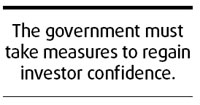Stock market's faults must be addressed
By Yi Xianrong (China Daily)
Updated: 2008-03-27 07:22
Updated: 2008-03-27 07:22
On March 18, the benchmark Shanghai Composite Index slid 151.15 points to close at 3,668.9, over 40 percent off from its peak of 6,124 on October 16, 2007.
The slide stopped the next day on news that the US Federal Reserve cut the interest rate. The Shanghai Composite Index rose by 2.53 percent to 3,761 on March 19 and the Shenzhen Component Index jumped by 4.45 percent to 13,044.

The rise on March 19 was hailed by the media the stock market was beginning to see the end of several months of lows, and was turning bullish again.
However, such an optimistic opinion proved unfounded. The Shanghai index slumped to 3,626 on March 24, a 4.49 percent drop for a trading day.
The stock market is not going to turn bullish unless the government takes ironhanded measures to regain investor confidence.
There are multiple reasons behind the latest slump in the stock market, like fluctuations on the global financial market, but one of the most fundamental reasons is that the market is loaded with activities and practices that go against the logic of a market economy.
One of the drawbacks to investor confidence is that non-tradable shares are not released on the market as tradable shares in a transparent manner.
Other malpractices that should be checked include the issuance of new shares by listed companies not approved through prudent procedures. There have been several examples of insider trading going unpunished, and a reduction in stamp duty on trades remains just a plan on paper.
Investors naturally feel uncertain about the future of the market when they do not see signs the government is going to take action to stamp out malpractices, but resorts to other means to stabilize the market, like approving more mutual funds.
Once investor confidence is no longer as solid as it was, the market will only slide further. Seeing the market lose 40 percent from its peak within months only further dampens investor confidence, and this could lead to panic.
Blue chip stocks, the most stable, though not usually the most dramatic in terms of investment, have witnessed a continuous slide.
In China's immature stock market, an average investor sells his or her stocks much faster than their counterparts in a mature market. The habit of trying to secure gains within days or weeks makes investors more sensitive to the daily ups and downs of the market.
It also shows their sense of market insecurity. Investors would be less likely to panic if they took a long-term view of the market. Therefore, the most urgent task for the decision-makers now is to boost market knowledge to instill investor confidence.
Other measures include the consolidation of market order, and manipulation, like insider trading, be eradicated by all possible means.
A recent media report said a person had earned more than 50 million yuan ($6.9 million) through buying ST stocks (Special Treatment), a label for a listed company that has posted annual losses for two consecutive years. Speculation abounds that he had made the profits because he was in possession of some insider information.
In the face of such news, the market watchdog should investigate the case and make public the results. This would be a good case for the authorities to show their determination to wipe out insider trading.
There have also been reports that several senior managers of listed companies had quit their jobs to sell the stocks of their former companies. And some had been re-employed after successfully negotiating deals.
This is an intolerable abuse of the regulations concerning the corporate governance of listed companies. The market supervisors must punish these individuals and companies.
The unlocking of non-tradable shares should follow open procedures. It is feasible that every company should present a timetable for public review and the watchdog's approval, before unloading the shares on the market.
The authorities should also take a closer look at the new share plans of listed companies and improve procedures for companies applying for initial public offerings.
All the malpractices and defect procedures may seem insignificant compared with the macro outlook of the market, but they are the very factors that could destroy investor confidence.
The authorities must move quickly and firmly to consolidate the domestic stock market according to the rules of a market economy. This is the right way to restore investor confidence and pump up the market again, otherwise, the market might show more volatility than we have ever experienced.
The author is a researcher with the Institute of Finance and Banking under the Chinese Academy of Social Sciences
(China Daily 03/27/2008 page8)
|
|
|
|